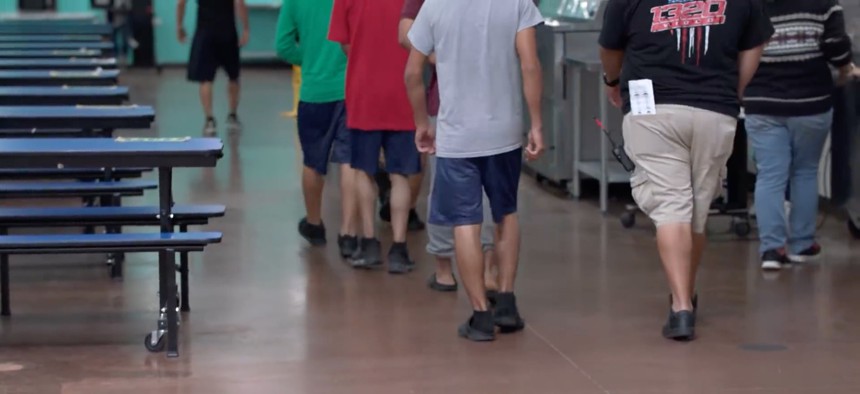The Trump administration’s policy of separating migrants from their children has prompted a national moral reckoning, with comparisons to Nazi Germany and the internment of Japanese-Americans during World War II, but the president and his aides have provided few signs that they will change course—despite the pressure, including from allies. The administration is caught between its need to secure the border and deter illegal immigration with the political, and moral, consequences of separating people from their children, a policy that could fast become a political nightmare for Republicans ahead of the midterm elections in November.
Melania Trump, the first lady, entered the debate Sunday when a spokeswoman said: “Mrs. Trump hates to see children separated from their families and hopes both sides of the aisle can finally come together to achieve successful immigration reform. She believes we need to be a country that follows all laws, but also a country that governs with heart.”
Also on Sunday, The Washington Post published an op-ed by Laura Bush, the wife of President George W. Bush, in which the former first lady described the separations as "cruel" and "immoral," despite “the need to enforce and protect our international boundaries." Bush, making a rare foray into a public-policy issue, also compared the images from the border to “the Japanese American internment camps of World War II, now considered to have been one of the most shameful episodes in U.S. history.”
Democrats have rallied against the policy, have protested outside detention centers, and urged the Trump administration to reverse course. On Sunday, Father’s Day, about 500 people gathered outside a federal detention facility in Elizabeth, New Jersey, chanting against the administration’s policy: “For all the fathers in detention, you are not forgotten.”
Seven Democratic members of Congress from New Jersey and New York, who were among them, were allowed inside to meet with five migrants who had been separated from their children at the U.S. border with Mexico. The men were emotional, the lawmakers said; some did not know where their children were being detained, they said.
I'm leaving the ICE Detention facility in Elizabeth, NJ after having met with 5 men, fathers, who came here seeking asylum and instead were separated from their families. This is what they shared with me: pic.twitter.com/9JcCBCPBMO
— Carolyn B. Maloney (@RepMaloney) June 17, 2018
“What I saw in there is inhumane,” Representative Albio Sires of New Jersey said at a subsequent news conference. “I see the politics of this administration and it turns my stomach, because I know what this country stands for. And that’s not what we are in America.”
In Texas, Democratic lawmakers visited a facility in McAllen. There, Representative Vicente Gonzalez of Texas said he saw about 100 children who were younger than six. “It was orderly, but it was far from what I would call humane,” he told The Washington Post.
The U.S. Border Patrol allowed reporters to visit the facility in McAllen. An AP reporter described what he saw: “More than 1,100 people were inside the large, dark facility that’s divided into separate wings for unaccompanied children, adults on their own, and mothers and fathers with children. The cages in each wing open out into common areas to use portable restrooms. The overhead lighting in the warehouse stays on around the clock.” The reporters were not allowed to take photos or interview detainees.
Evangelical leaders, often among Trump’s most ardent supporters, have been among the most vocal critics of the policy. Franklin Graham, the evangelical leader, called the separation of migrants from their children: “disgraceful.” “It’s terrible to see families ripped apart and I don’t support that one bit,” he told the Christian Broadcasting Network last week.
Republican Senators Jeff Flake of Arizona and Susan Collins of Maine have criticized the policy, as have many veterans of the Bush administration. Few other elected Republicans have publicly broken with the Trump administration. On Sunday, Trump took to Twitter to blame Democrats for “their forced family breakup at the Border”—though the “zero-tolerance” policy is his administration’s. He made similar remarks Monday, taunting Democrats and linking the issue to the outcome of the midterm elections in November.
At issue is the “zero-tolerance” policy announced last month by Jeff Sessions, the attorney general, toward anyone who enters the U.S. illegally. As part of this policy, children and the adults with whom they are traveling are separated when the adult is referred for prosecution for attempting to enter the country illegally. The children are then turned over to the U.S. Department of Health and Human Services, which houses them in facilities while they await placement with a sponsor as their immigration case makes its way through the system. The White House maintains that it is simply enforcing existing law, citing a 1997 legal agreement as well as a human-trafficking bill from 2008 as its legal rationale. But neither the Bush nor the Obama administrations pursued the policy—deeming it inhumane.



